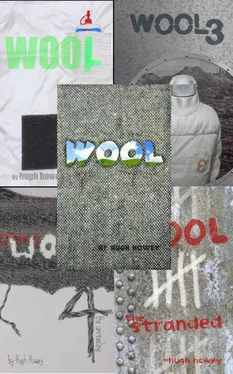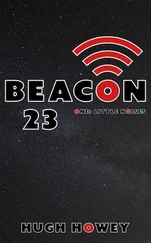And then there was the rotting skyline and the images in the children’s books, both of which seemed to hold clues. The priests, of course, would say that the skyline was evidence that man wasn’t supposed to exceed his bounds. And the books with the faded color pages? The fanciful imagination of authors, a class done away with for all the trouble they inspired.
But Juliette didn’t see fanciful imagination in those books. She had spent a childhood in the nursery, reading each one over and over whenever they weren’t checked out, and things in them and in the wondrous plays performed in the bazaar made more sense to her than this crumbling cylinder in which they lived.
She wiggled the last of the water hoses free and began separating the pump from its motor. The hint of steel shavings suggested a chewed-up impeller, which meant pulling the shaft. As she worked on automatic, cruising through a job she’d performed numerous times before, she thought back on the myriad of animals that populated those books, most of which had never been seen by living eyes. The only fanciful part, she figured, was that they all talked and acted human. There were mice and chickens in several of the books that performed these stunts as well, and she knew their breeds were incapable of speech. All those other animals must exist somewhere, or used to. She felt this to the core, maybe because they weren’t imaginative at all. Each seemed to follow the same plan, just like all the silo’s pumps. You could tell one was based on the other. A particular design worked, and whoever had made one had made them all.
The silo made less sense. It hadn’t been created by a God—it was probably designed by IT. This was a new theory, but she felt more and more sure of it. They controlled all the important parts. Cleaning was the highest law and the deepest religion, and both of these were intertwined and housed within its secretive walls. And then there was the spacing from Mechanical and the spread of the deputy stations—more clues. Not to mention the clauses in the Pact, which practically granted them immunity. And now the discovery of a second supply chain, a series of parts engineered to fail, a purpose behind the lack of progress in survival time on the outside. IT had built this place and IT was keeping them there.
Juliette nearly stripped a bolt, she was so agitated. She turned to look for Caryl, but the younger woman was already gone, her repair patch a darker shade of gray as it waited to dry and blend in with the rest. Looking up, Juliette scanned the ceiling of the pump room where conduits of wire and piping traveled through the walls and mingled overhead. A run of steam pipes stood clustered to the side to keep from melting any of the wires; a ribbon of heat tape hung off one of these pipes in a loose coil. It would have to be replaced soon, she thought. That tape might be ten or twenty years old. She considered the stolen tape that had caused so much of the mess she was in, and how it would’ve been lucky to survive twenty minutes up there.
And that’s when Juliette realized what she must do. A project to pull the wool back from everyone’s eyes, a favor to the next fool who slipped up or dared to hope aloud. And it would be so easy. She wouldn’t have to build anything herself—they would do all the work for her. All it would take would be some convincing, and she was mighty good at that.
She smiled, a list of parts forming in her head as the broken impeller was removed from the faulty pump. All she would need to fix this problem was a replacement part or two. It was the perfect solution to getting everything in the silo working properly once more.
••••
Juliette worked two full shifts, wearing her muscles to a numb ache before returning her tools and showering. She worked a stiff brush under her nails over the bathroom sink, determined to keep them up-top clean. She headed toward the mess hall, looking forward to a tall plate of high-energy food rather than the weak rabbit stew from the cafeteria on level one, when she passed through Mechanical’s entrance hall and saw Knox talking to Deputy Hank. The way they turned and stared, she knew they were talking about her. Juliette’s stomach sank. Her first thought was of her father. And then Peter. Who else could they take away from her that she might care about? They wouldn’t know to contact her about Lukas, whatever he was to her.
She made a swift turn and headed their direction, even as the two of them moved to intercept her. The looks on their faces confirmed her every fear. Something awful had happened. Juliette barely noticed Hank reaching for his cuffs.
“I’m sorry, Jules,” he said, as they got close.
“What happened?” Juliette asked. “Dad?”
Hank’s brow wrinkled in confusion. Knox was shaking his head and chewing on his beard. He studied the deputy like he might eat the man.
“Knox, what’s going on?”
“Jules, I’m sorry.” He shook his head. He seemed to want to say more but was powerless to do so. Juliette felt Hank reaching for her arm.
“You are under arrest for grave crimes against the silo.”
He recited the lines like they were from a sad poem. The steel clicked around her wrist.
“You will be judged and sentenced according to the Pact.”
Juliette looked up at Knox. “What is this?” she asked. Was she really being arrested again?
“If you are found guilty, you will be given a chance at honor.”
“What do you want me to do?” Knox whispered, his vast muscles twitching beneath his coveralls. He wrung his hands together, watching the second metal band clack around her other wrist, her two hands shackled together now. The large Head of Mechanical seemed to be contemplating violence—or worse.
“Easy, Knox,” Juliette said. She shook her head at him. The thought of more people getting hurt because of her was too much to bear.
“Should humanity banish you from this world—” Hank continued to recite, his voice cracking, his eyes wet with shame.
“Let it go,” Juliette told Knox. She looked past him to where more workers were coming off second shift, stopping to see this spectacle of their prodigal daughter being put in cuffs.
“—in that banishment, may you find your sins scrubbed, scrubbed away,” Hank concluded.
He looked up at her, one hand gripping the chain between her wrists, tears streaking down his face.
“I’m sorry,” he said.
Juliette nodded to him. She set her teeth and nodded to Knox as well.
“It’s alright,” she said. She kept bobbing her head. “It’s alright, Knox. Let it go.”
The climb up was to take three days. Longer than it should have, but there were protocols. A day trip up to Hank’s office, a night in his cell, Deputy Marsh coming down the next morning from the mids to escort her up another fifty levels to his office.
She felt numb during this second day of climbing, the looks from passersby sliding off her like water on grease. It was difficult to concern herself with her own life—she was too busy tallying all the others, some of them because of her.
Marsh, like Hank, tried to make small talk, and all Juliette could contemplate to say in return was that they were on the wrong side. That evil ran amuck. But she kept her mouth shut.
At the mids deputy station, she was shown to a familiar enough cell, just like the one in Hank’s. No wallscreen, just a stack of primed cinderblocks. She collapsed onto the bunk before he even had the gate locked, and lay there for what felt like hours, waiting for night to come and pass to dawn, for Peter’s new deputy to come and march her up the last leg of her journey.
She checked her wrist often, but Hank had confiscated her watch. He probably wouldn’t even know how to wind it. The thing would eventually fall into disrepair and return to being a trinket, a useless thing worn upside down for its pretty band.
Читать дальше












